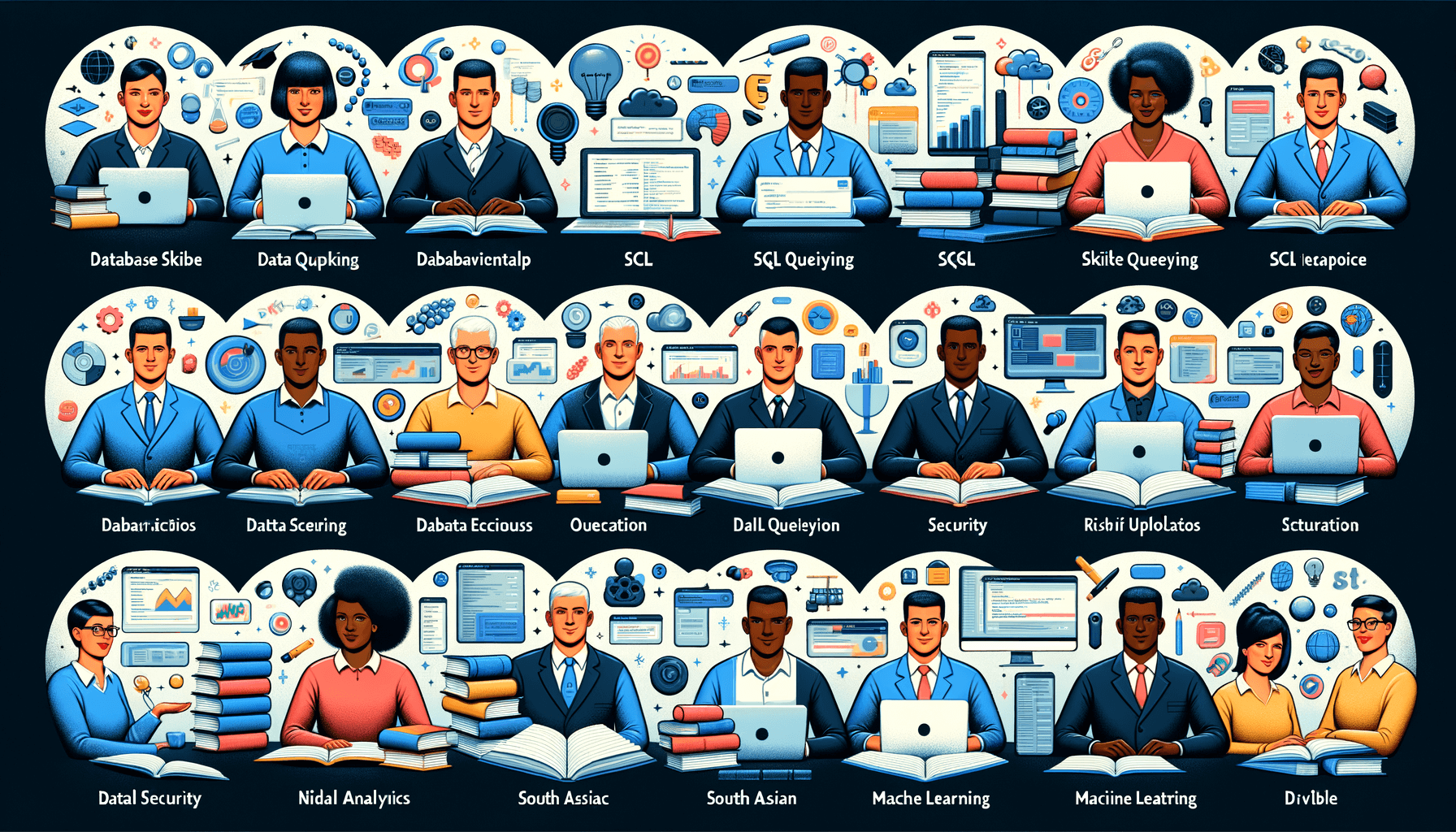A big variety of articles and resources

Unlock Your Data Potential: The Best SQL Course Online for Aspiring Analysts
 Sia Author and Instructor
Learn SQL
Sia Author and Instructor
Learn SQL
9 minute read
In today's data-driven world, knowing how to use SQL is super important for anyone who wants to be a data analyst. SQL helps you get useful information from data, which is a key skill in many jobs today. This article will help you find the best online SQL course to unlock your data potential.
Key Takeaways
- SQL is crucial for modern data analysis and is in high demand in the job market.
- A good SQL course should cover all the basics and offer interactive and real-world learning experiences.
- When choosing an SQL course, look for accreditation, certification, and positive student reviews.
- Learning advanced SQL techniques like complex queries and data manipulation can boost your career.
- Balancing theory with hands-on practice is important for mastering SQL.
The Importance of SQL in Data Analysis
Role of SQL in Modern Data Analysis
SQL is a key tool for anyone working with data. It helps us pull and work with data from databases. This is important for making smart choices based on data. SQL is the backbone of data analysis because it lets us get, change, and look at data quickly and easily.
SQL vs. Other Data Query Languages
While there are other ways to get data, SQL is the most popular. It's easier to learn and use than many other tools. Plus, it works with most database systems. This makes it a top choice for data analysts who need to work with data every day.
Industry Demand for SQL Skills
Knowing SQL can help you get a job. Many companies want workers who can use SQL. This is true for many jobs, like a data analyst, a junior analyst, or even a marketing analyst. Learning SQL can open many doors in your career.
SQL is not just a skill; it's a must-have for anyone serious about data analysis. It helps you stand out in the job market and gives you the tools to make data-driven decisions.
Key Features of an Effective SQL Course Online
Comprehensive Curriculum Coverage
A good SQL course should cover all the basics and advanced topics. This includes everything from simple queries to complex joins and data manipulation. A well-rounded curriculum ensures that learners are prepared for real-world challenges.
Interactive Learning Modules
Interactive modules make learning SQL more engaging. These can include quizzes, coding exercises, and interactive lessons. Hands-on practice helps solidify the concepts and makes the learning process enjoyable.
Real-World Case Studies
Using real-world case studies in the course helps learners understand how SQL is used in actual scenarios. This practical approach makes it easier to apply what they've learned in their jobs.
Real-world examples bridge the gap between theory and practice, making the learning experience more relevant and impactful.
Evaluating the Best SQL Course Online
Criteria for Course Selection
When choosing an SQL course, we need to consider several factors. Course content should cover both basic and advanced topics. Look for courses that offer hands-on projects and real-world applications. The teaching style should be engaging and easy to follow.
Accreditation and Certification
Accreditation is crucial when selecting an SQL course. Accredited courses are recognized by industry leaders and can boost your resume. Certification upon completion is also important as it validates your skills and knowledge.
Student Reviews and Testimonials
Reading student reviews can provide insights into the course quality. Look for feedback on the course structure, instructor effectiveness, and overall learning experience. Positive testimonials often highlight the practical benefits and career advancements achieved through the course.
Choosing the right SQL course can significantly impact your learning journey and career prospects. Make sure to evaluate all aspects before making a decision.
Advanced SQL Techniques for Aspiring Analysts
Complex Queries and Joins
In the world of data analysis, mastering complex queries and joins is essential. These techniques allow us to combine data from multiple tables, providing a comprehensive view of the information. Understanding how to use INNER JOIN, LEFT JOIN, RIGHT JOIN, and FULL JOIN can significantly enhance our data analysis capabilities. By practicing these joins, we can extract meaningful insights from large datasets.
Data Manipulation and Transformation
Data manipulation and transformation are crucial skills for any aspiring analyst. These techniques enable us to clean, format, and prepare data for analysis. We can use SQL functions like UPDATE, DELETE, and INSERT to modify data, while functions like CAST and CONVERT help in transforming data types. Mastering these functions ensures that our data is accurate and ready for analysis.
Performance Optimization
Performance optimization is vital when working with large datasets. Efficient SQL queries can save time and resources. Techniques such as indexing, query optimization, and proper use of subqueries can greatly improve query performance. By focusing on these optimization strategies, we can ensure that our analyses are both fast and efficient.
Advanced SQL techniques are not just about writing complex queries; they are about writing efficient and effective queries that provide valuable insights.
Career Opportunities for SQL-Proficient Analysts
Job Roles and Responsibilities
SQL skills open doors to various job roles in the data field. These roles include Data Analyst, Business Intelligence Analyst, and Database Administrator. Each role involves working with data to help organizations make informed decisions. Data Analysts focus on interpreting data, while Business Intelligence Analysts create reports and dashboards. Database Administrators manage and maintain databases to ensure they run smoothly.
Salary Expectations
The demand for SQL-proficient analysts is high, leading to competitive salaries. Entry-level positions can start at around $60,000 per year, while experienced professionals can earn upwards of $100,000 annually. The salary can vary based on factors like location, industry, and level of expertise.
Career Growth and Development
Career growth for SQL-proficient analysts is promising. As you gain experience, you can move into senior roles or specialize in areas like data engineering or data science. Continuous learning and practical skills enhancement through real-world problems are crucial for career advancement. Many professionals also pursue certifications to validate their skills and stay competitive in the job market.
The journey to becoming a skilled SQL analyst involves continuous learning and adapting to new technologies. Embracing challenges and seeking out real-world problems to solve can significantly boost your career trajectory.
Supplementary Resources to Enhance SQL Learning
Books and Publications
To jumpstart SQL learning, we recommend starting with free introductory lessons. These resources often provide a solid foundation and can be a great way to get familiar with the basics. Beyond basic SQL training, there are many books and publications that offer hands-on projects, personalized support, and industry insights. One notable instructor, Eric Vanier, who has 25 years of experience, offers a comprehensive guide that is highly recommended.
Online Forums and Communities
Engaging with online forums and communities can be incredibly beneficial. These platforms allow you to compare your progress with other learners, ask questions, and get real-time feedback. Subscribing to these communities can unlock free SQL courses and provide a wealth of knowledge from experienced professionals.
Practice Datasets and Projects
Working on practice datasets and projects is crucial for mastering SQL. These practical exercises help you apply what you've learned in real-world scenarios. Many platforms offer these resources, allowing you to gain hands-on experience and improve your skills. This approach not only reinforces your learning but also prepares you for industry demands.
Balancing Theory and Practice in SQL Education
Importance of Hands-On Experience
In SQL education, hands-on experience is crucial. It allows students to apply what they've learned in real-world scenarios. For instance, the Zero to PostgreSQL Junior DBA course offers practical SQL training with real-world problem-solving. This approach helps students understand the material better and prepares them for actual job tasks.
Theoretical Foundations
While practical skills are essential, a strong theoretical foundation is equally important. Understanding the underlying principles of SQL and database management ensures that students can adapt to new challenges and technologies. This balance between theory and practice creates well-rounded professionals.
Blended Learning Approaches
Blended learning combines online resources with traditional classroom methods. This approach offers flexibility and a comprehensive learning experience. Students can benefit from interactive modules, video lectures, and in-person discussions. Blended learning ensures that students get the best of both worlds, making their education more effective and engaging.
Learning SQL can be tricky, but with the right mix of theory and practice, you can master it. Our courses are designed to help you understand the basics and then apply them in real-world situations. Ready to start your journey? Visit our website to find the perfect course for you and take the first step towards becoming a SQL expert!
Conclusion
In conclusion, learning SQL is a crucial step for anyone looking to become a data analyst. The right online course can make this journey easier and more effective. By choosing a course that fits your learning style and goals, you can unlock the full potential of your data skills. Remember, the best course is one that keeps you engaged and motivated. So, take the time to research and pick the one that suits you best. Happy learning!
Frequently Asked Questions
Why is SQL important for data analysis?
SQL helps you get information from databases. It's a key skill for anyone who wants to work with data.
How does SQL compare to other data query languages?
SQL is easier to learn and use. It is widely used in many industries, unlike some other query languages.
What should I look for in a good online SQL course?
Look for a course that covers all the basics, has interactive lessons, and uses real-world examples.
Are there advanced SQL techniques I should know?
Yes, advanced techniques like complex queries, data manipulation, and performance optimization are very important.
What kind of jobs can I get with SQL skills?
With SQL skills, you can work as a data analyst, database manager, or business analyst. These jobs often pay well.
Where can I find extra resources to help me learn SQL?
You can find books, join online forums, and use practice datasets to improve your SQL skills.
Related Articles

Master SQL with Our Free Online Programming Course
8 minute read






